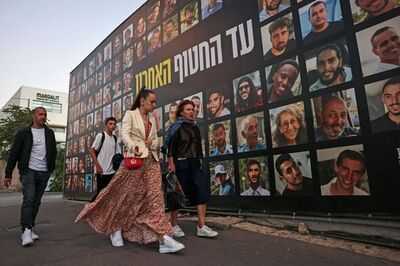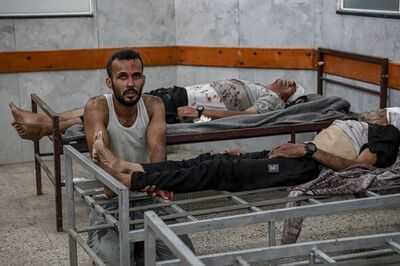The BBC has once again been forced to apologise over its approach to the Israel-Hamas war, after describing the October 7th terror attacks in southern Israel as "escalations". But it's far from the first time in the conflict that the taxpayer-funded broadcaster has been accused of anti-Israel bias and had to backtrack on its stance.
 In an internal memo sent to staff from the BBC Audiences team - intending to advise on best tailoring content to audiences - employees were told ‘As we reach the two-year anniversary of the escalations in the Israel-Gaza conflict, we asked UK audiences what they want and need from news coverage moving forward." " data-has-syndication-rights="1" data-portal-copyright="BBC" data-licensor-name="BBC" />
In an internal memo sent to staff from the BBC Audiences team - intending to advise on best tailoring content to audiences - employees were told ‘As we reach the two-year anniversary of the escalations in the Israel-Gaza conflict, we asked UK audiences what they want and need from news coverage moving forward." " data-has-syndication-rights="1" data-portal-copyright="BBC" data-licensor-name="BBC" /> The broadcaster said: "This internal staff email should have been worded differently and we're sorry for any offence caused. We are editing it and will replace the text on our intranet."
" data-has-syndication-rights="1" data-portal-copyright="Getty" data-licensor-name="Getty" />The documentary Gaza: How to Survive a Warzone was originally aired on BBC 2 on February 17, but was later pulled from iPlayer on February 21 after it emerged its 14-year-old narrator Abdullah Al-Yazouri was the son of Hamas's deputy agricultural minister Ayman Al-Yazouri.
" data-has-syndication-rights="1" data-portal-copyright="BBC" data-licensor-name="BBC" />"Some of these were made by the production company and some by the BBC; all of them are unacceptable. BBC News takes full responsibility for these and the impact that these have had on the corporation's reputation. We apologise for this."
" data-has-syndication-rights="1" data-portal-copyright="BBC" data-licensor-name="BBC" /> referred to Israeli hostages held by Hamas as "Israeli prisoners".
referred to Israeli hostages held by Hamas as "Israeli prisoners". Yarden Bibas, 35, Ofer Kalderon, 54, and Keith Siegel, 65, were taken hostage during Hamas' terror attacks of October 7, 2023. The men were handed over by militants to Red Cross officials in Khan Tounis on Saturday morning.
Viewers on social media fumed over the "insane word choice", with one writing: "They just keep bending over backwards to twist the narrative, but the truth is plain: Kidnapped civilians are hostages not ‘prisoners'."
" data-has-syndication-rights="1" data-portal-copyright="Getty" data-licensor-name="Getty" />"At one point during the coverage we mistakenly called the hostages ‘prisoners' and we would like to apologise."
" data-has-syndication-rights="1" data-portal-copyright="Getty" data-licensor-name="Getty" />
However, the actual article said something completely different - that trained IDF teams were accompanied by medical staff and Arabic-speaking soldiers to assist in a humanitarian effort.
The anchor clarified at the time: "This was incorrect and misquoted a Reuters report. What we should have said is that IDF forces included medical staff and Arabic speakers for this operation."
Meanwhile, a statement from the BBC read: "We apologise for this error which fell below our usual editorial standards. The correct version of events was broadcast minutes later."
" data-has-syndication-rights="1" data-portal-copyright="Getty" data-licensor-name="Getty" />The BBC later said: "In overnight output [on BBC radio news bulletins] we ran a story about Hamas accusing the Israeli army of carrying out summary executions in the Gaza strip.
"This was a Hamas statement, but although the accusations were attributed and our story contained a response from the Israeli military saying they were unaware of the incident and that Hamas was a terrorist organisation that did not value truth, we had not made sufficient effort to seek corroborating evidence to justify reporting the Hamas claim. We apologise for this mistake."
" data-has-syndication-rights="1" data-portal-copyright="Getty" data-licensor-name="Getty" />You may also like

'Intentionally, maliciously mischaraterized': Jimmy Kimmel defends comments on Charlie Kirk; calls reactions distortion

'Going solo in Goa a mistake', says Rajesh Kalangutkar after resigning as AAP's working president

Madeleine McCann sister reveals 'scary' six word vow of 'stalker'

SC agrees to hear plea seeking extension of timeline for registration of Waqf properties

'Mediterranean' breakfast Victoria Beckham eats for slim figure and glowing skin






